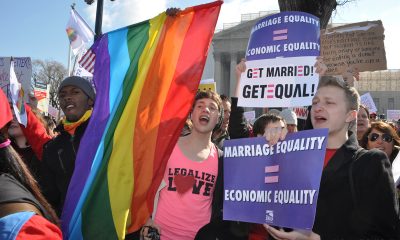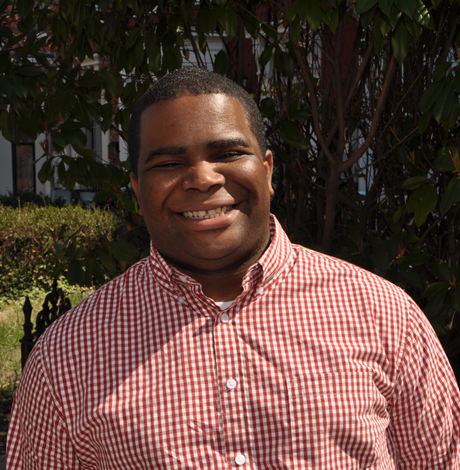National
Calif. high court: Prop 8 supporters can continue case
Justices unanimous in opinion

The California Supreme Court issued a unanimous opinion on Thursday that proponents of the state’s same-sex marriage ban have standing to defend the measure against litigation in court.
In the decision, the court determined that anti-gay groups that were responsible for putting Proposition 8 before California voters in 2008 can defend the measure in the case of Perry v. Brown.
“[W]hen the public officials who ordinarily defend a challenged state law or appeal a judgment invalidating the law decline to do so … the official proponents of a voter-approved initiative measure are authorized to assert the state’s interest in the initiative’s validity, enabling the proponents to defend the constitutionality of the initiative and to appeal a judgment invalidating the initiative,” the court wrote.
Each of the seven justices penned their name to the court’s opinion. Associate Justice Joyce Kennard wrote a concurring opinion to “highlight the historical and legal events” that led to the decision.
Groups responsible for Prop 8, including ProtectMarriage.com, are seeking the ability to defend the measure in court because state officials have elected not to participate in litigation against the measure. California Gov. Jerry Brown (D) and Attorney General Kamala Harris (D) have decided not to defend the law — just as former Gov. Arnold Schwarzenegger (R) and Brown in his previous capacity as attorney general chose not to defend it.
The case is pending before a three-judge panel with the U.S. Ninth Circuit Court of Appeals, which in January asked the California Supreme Court to consider whether Prop 8’s proponents had standing to defend the amendment in court.
The California Supreme Court ruling is a recommendation; standing remains a question of federal law. The state court is simply providing advice to the Ninth Circuit on the legal rights of ballot initiative proponents under state law.
After an indeterminate time passes, the Ninth Circuit will make its own decision on whether Prop 8 proponents have standing to defend the measure as it considers the case. Observers say the Ninth Circuit will likely concur that Prop 8 backers can continue the case, then proceed to consider the case on its merits. From there, the case could be appealed to the Supreme Court.
The case arrived at the Ninth Circuit on appeal after now retired U.S. District Judge Vaughn Walker ruled against Prop 8 last year on the basis that the measure violated the Due Process and Equal Protection Clauses of the U.S. Constitution because it singles out gays for unfair treatment under the law.
The lawsuit was filed by the American Federation for Equal Rights, which selected Ted Olson, a U.S. solicitor general under former President George W. Bush, and David Boies, a private attorney and chairman of the law firm Boies, Schiller & Flexner, to lead the case.
In a statement, Olson said he’s “pleased” the California high court has responded to Ninth Circuit’s question and expects swift action from the appellate court.
“Important questions of federal law remain pending before the Ninth Circuit, including, most significantly, the constitutionality of Proposition 8,” Olson said. “We now anticipate a prompt and thorough resolution of those questions by the federal appeals court, which, we expect, will affirm the trial court’s comprehensive and compelling decision that Proposition 8 violates the Due Process and Equal Protection Clauses. We hope that the long wait for justice by gay and lesbian Californians will soon be over.”
Chad Griffin, AFER’s board president, expressed similar confidence and said the lawsuit “is now back on the fast track.”
“We are back in federal court and on the cusp of victory for loving, committed gay and lesbian couples whose constitutional rights are being violated every minute of every day,” Griffin said. “The anti-marriage proponents have no case. We are confident that the higher courts will uphold the District Court’s opinion that Proposition 8 is unconstitutional.”
LGBT advocates have had mixed views on whether granting standing to proponents of Prop 8 would be beneficial for same-sex couples, although most had said they didn’t want the anti-gay groups to be allowed to defend the law in court.
If the Ninth Circuit finds that Prop 8 supporters don’t have standing, the case is dismissed for lack of jurisdiction and California’s marriage ban is lifted. However, some have said granting these groups standing and enabling the case to continue could take it to the U.S. Supreme Court, which could then decide on whether U.S. Constitution provides marriage rights to gay couples throughout the country.
Jon Davidson, legal director for Lambda Legal, called the ruling “disappointing,” but said he anticipates “a quick victory” in the Ninth Circuit for same-sex couples.
“The ruling addresses only a procedural legal question,” Davidson said. “The key question underlying this case is whether the U.S. Constitution permits a state electorate to treat one group of people unequally to everyone else by depriving them of what the state’s high court has held to be a fundamental right. A federal court has already ruled that it may not. We look forward to seeing that decision upheld so that same-sex couples in California may once again enjoy the freedom to marry.”
Shannon Minter, legal director for the National Center for Lesbian Rights, called the ruling a “terrible decision” in terms of its impact on California law.
“The court has given initiative proponents unprecedented and virtually unlimited power, and the people of California will be living with the dangerous consequences of that decision for years to come,” Minter said.
While LGBT groups found the court decision unpalatable, the anti-gay National Organization for Marriage praised the Supreme Court for determining that proponents of Prop 8 should have standing.
Brian Brown, NOM’s president, said “it was shameful” state officials would “abdicate their constitutional responsibility” and elect not to defend the marriage ban in court.
“Although today’s ruling from the California Supreme Court confirms that the proponents of Prop 8 have the right to defend their initiative when the state officials refuse to fulfill their sworn duty, it is gratifying to know that the over 7 million Californians who supported the initiative will have a vigorous defense of their decision in our federal courts,” Brown said.
Brown expressed confidence that the U.S. Supreme Court would overturn against any decision against the marriage ban made by the Ninth Circuit.
“Once this case gets out of San Francisco and reaches the U.S. Supreme Court, we fully expect to be victorious,” Brown said.
National
Same-sex couples vulnerable to adverse effects of climate change
Williams Institute report based on Census, federal agencies

A new report by the Williams Institute at the UCLA School of Law finds that same-sex couples are at greater risk of experiencing the adverse effects of climate change compared to different-sex couples.
LGBTQ people in same-sex couple households disproportionately live in coastal areas and cities and areas with poorer infrastructure and less access to resources, making them more vulnerable to climate hazards.
Using U.S. Census data and climate risk assessment data from NASA and the Federal Emergency Management Agency, researchers conducted a geographic analysis to assess the climate risk impacting same-sex couples. NASA’s risk assessment focuses on changes to meteorological patterns, infrastructure and built environment, and the presence of at-risk populations. FEMA’s assessment focuses on changes in the occurrence of severe weather events, accounting for at-risk populations, the availability of services, and access to resources.
Results show counties with a higher proportion of same-sex couples are, on average, at increased risk from environmental, infrastructure, and social vulnerabilities due to climate change.
“Given the disparate impact of climate change on LGBTQ populations, climate change policies, including disaster preparedness, response, and recovery plans, must address the specific needs and vulnerabilities facing LGBTQ people,” said study co-author Ari Shaw, senior fellow and director of international programs at the Williams Institute. “Policies should focus on mitigating discriminatory housing and urban development practices, making shelters safe spaces for LGBT people, and ensuring that relief aid reaches displaced LGBTQ individuals and families.”
“Factors underlying the geographic vulnerability are crucial to understanding why same-sex couples are threatened by climate change and whether the findings in our study apply to the broader LGBTQ population,” said study co-author Lindsay Mahowald, research data analyst at the Williams Institute. “More research is needed to examine how disparities in housing, employment, and health care among LGBT people compound the geographic vulnerabilities to climate change.”
Read the report
Federal Government
Lambda Legal praises Biden-Harris administration’s finalized Title IX regulations
New rules to take effect Aug. 1

The Biden-Harris administration’s revised Title IX policy “protects LGBTQ+ students from discrimination and other abuse,” Lambda Legal said in a statement praising the U.S. Department of Education’s issuance of the final rule on Friday.
Slated to take effect on Aug. 1, the new regulations constitute an expansion of the 1972 Title IX civil rights law, which prohibits sex-based discrimination in education programs that receive federal funding.
Pursuant to the U.S. Supreme Court’s ruling in the landmark 2020 Bostock v. Clayton County case, the department’s revised policy clarifies that discrimination on the basis of sexual orientation and gender identity constitutes sex-based discrimination as defined under the law.
“These regulations make it crystal clear that everyone can access schools that are safe, welcoming and that respect their rights,” Education Secretary Miguel Cardona said during a call with reporters on Thursday.
While the new rule does not provide guidance on whether schools must allow transgender students to play on sports teams corresponding with their gender identity to comply with Title IX, the question is addressed in a separate rule proposed by the agency in April.
The administration’s new policy also reverses some Trump-era Title IX rules governing how schools must respond to reports of sexual harassment and sexual assault, which were widely seen as imbalanced in favor of the accused.
Jennifer Klein, the director of the White House Gender Policy Council, said during Thursday’s call that the department sought to strike a balance with respect to these issues, “reaffirming our longstanding commitment to fundamental fairness.”
“We applaud the Biden administration’s action to rescind the legally unsound, cruel, and dangerous sexual harassment and assault rule of the previous administration,” Lambda Legal Nonbinary and Transgender Rights Project Director Sasha Buchert said in the group’s statement on Friday.
“Today’s rule instead appropriately underscores that Title IX’s civil rights protections clearly cover LGBTQ+ students, as well as survivors and pregnant and parenting students across race and gender identity,” she said. “Schools must be places where students can learn and thrive free of harassment, discrimination, and other abuse.”
Michigan
Mich. Democrats spar over LGBTQ-inclusive hate crimes law
Lawmakers disagree on just what kind of statute to pass

Michigan could soon become the latest state to pass an LGBTQ-inclusive hate crime law, but the state’s Democratic lawmakers disagree on just what kind of law they should pass.
Currently, Michigan’s Ethnic Intimidation Act only offers limited protections to victims of crime motivated by their “race, color, religion, gender, or national origin.” Bills proposed by Democratic lawmakers expand the list to include “actual or perceived race, color, religion, gender, sexual orientation, gender identity or expression, ethnicity, physical or mental disability, age, national origin, or association or affiliation with any such individuals.”
Democratic Gov. Gretchen Whitmer and Attorney General Dana Nessel have both advocated for a hate crime law, but house and senate Democrats have each passed different hate crimes packages, and Nessel has blasted both as being too weak.
Under the house proposal that passed last year (House Bill 4474), a first offense would be punishable with a $2,000 fine, up to two years in prison, or both. Penalties double for a second offense, and if a gun or other dangerous weapons is involved, the maximum penalty is six years in prison and a fine of $7,500.
But that proposal stalled when it reached the senate, after far-right news outlets and Fox News reported misinformation that the bill only protected LGBTQ people and would make misgendering a trans person a crime. State Rep. Noah Arbit, the bill’s sponsor, was also made the subject of a recall effort, which ultimately failed.
Arbit submitted a new version of the bill (House Bill 5288) that added sections clarifying that misgendering a person, “intentionally or unintentionally” is not a hate crime, although the latest version (House Bill 5400) of the bill omits this language.
That bill has since stalled in a house committee, in part because the Democrats lost their house majority last November, when two Democratic representatives resigned after being elected mayors. The Democrats regained their house majority last night by winning two special elections.
Meanwhile, the senate passed a different package of hate crime bills sponsored by state Sen. Sylvia Santana (Senate Bill 600) in March that includes much lighter sentences, as well as a clause ensuring that misgendering a person is not a hate crime.
Under the senate bill, if the first offense is only a threat, it would be a misdemeanor punishable by one year in prison and up to $1,000 fine. A subsequent offense or first violent hate crime, including stalking, would be a felony that attracts double the punishment.
Multiple calls and emails from the Washington Blade to both Arbit and Santana requesting comment on the bills for this story went unanswered.
The attorney general’s office sent a statement to the Blade supporting stronger hate crime legislation.
“As a career prosecutor, [Nessel] has seen firsthand how the state’s weak Ethnic Intimidation Act (not updated since the late 1980’s) does not allow for meaningful law enforcement and court intervention before threats become violent and deadly, nor does it consider significant bases for bias. It is our hope that the legislature will pass robust, much-needed updates to this statute,” the statement says.
But Nessel, who has herself been the victim of racially motivated threats, has also blasted all of the bills presented by Democrats as not going far enough.
“Two years is nothing … Why not just give them a parking ticket?” Nessel told Bridge Michigan.
Nessel blames a bizarre alliance far-right and far-left forces that have doomed tougher laws.
“You have this confluence of forces on the far right … this insistence that the First Amendment protects this language, or that the Second Amendment protects the ability to possess firearms under almost any and all circumstances,” Nessel said. “But then you also have the far left that argues basically no one should go to jail or prison for any offense ever.”
The legislature did manage to pass an “institutional desecration” law last year that penalizes hate-motivated vandalism to churches, schools, museums, and community centers, and is LGBTQ-inclusive.
According to data from the U.S. Department of Justice, reported hate crime incidents have been skyrocketing, with attacks motivated by sexual orientation surging by 70 percent from 2020 to 2022, the last year for which data is available.
Twenty-two states, D.C., Puerto Rico, and the U.S. Virgin Islands have passed LGBTQ-inclusive hate crime laws. Another 11 states have hate crime laws that include protections for “sexual orientation” but not “gender identity.”
Michigan Democrats have advanced several key LGBTQ rights priorities since they took unified control of the legislature in 2023. A long-stalled comprehensive anti-discrimination law was passed last year, as did a conversion therapy ban. Last month the legislature updated family law to make surrogacy easier for all couples, including same-sex couples.
A bill to ban the “gay panic” defense has passed the state house and was due for a Senate committee hearing on Wednesday.
-

 District of Columbia5 days ago
District of Columbia5 days agoNew D.C. LGBTQ+ bar Crush set to open April 19
-

 District of Columbia5 days ago
District of Columbia5 days agoReenactment of first gay rights picket at White House draws interest of tourists
-

 South America3 days ago
South America3 days agoDaniel Zamudio murderer’s parole request denied
-

 Opinions5 days ago
Opinions5 days agoOpen or closed? No, not your bar tab











